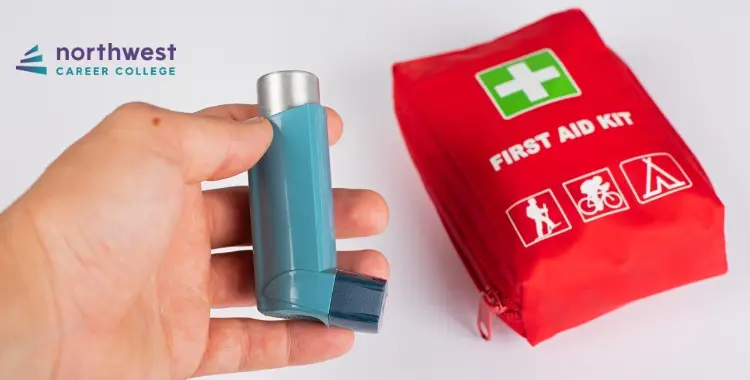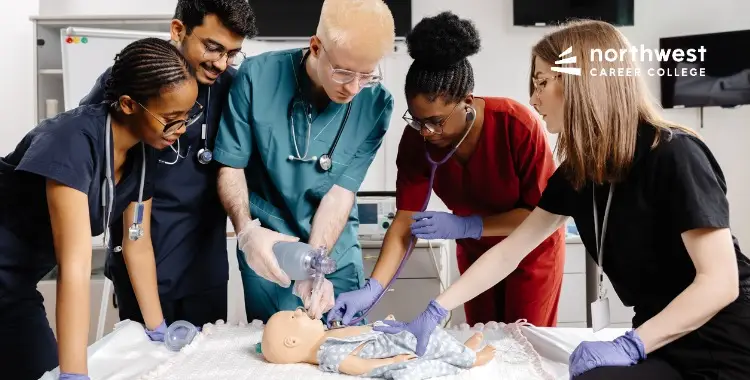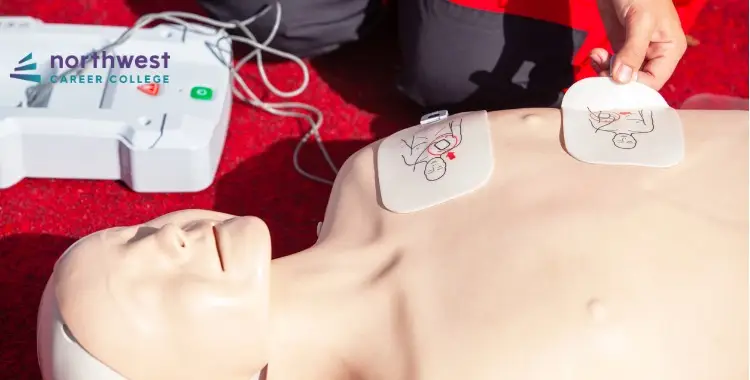First Aid for Asthma Sufferers
- CPR
- April 8, 2025
- 3.8k views
- 4 min read

Asthma is defined as an incurable chronic disease in which the lining of the bronchial tubes inflames and swells, causing difficulty breathing. It is extremely common in the US, with approximately 25 million people in the United States suffer from asthma, and 235 million all over the world.
Despite the number of people who suffer asthma attacks every year, about 1.7 million people go to the emergency room each year for asthma attacks, and more than 450,000 are hospitalized, many people don’t know exactly what to do to help a person suffering an asthma attack.
Thankfully, the fatality rate for asthma attacks is low, with only about 3,000 people per year die from asthma attacks in the United States, out of 25 million people with the condition. This is because there are some easy ways you can help someone suffering an asthma attack.
Table of Contents
What Are the Symptoms of an Asthma Attack?
Asthma attacks are usually caused by one of two things: inflammation of the airways, which includes swelling of the bronchial tube lining and buildup of excess mucus; or constriction of the muscles that surround the airways. Shortness of breath, wheezing, and coughing can occur. In severe cases, fingernails and lips can turn blue and the victim may have difficulty walking or talking.
What Can I Do to Help Someone Near Me Who Is Suffering from an Asthma Attack?
Alert the Emergency Services – The first thing to do when you see someone suffering from a severe asthma attack is to call the emergency services. This is especially true if they do not have their medication on them.
Even in the case of mind asthma attacks, it is always best to conduct the victim to an emergency ward to be checked over. Asthma attacks can come in clusters, especially if caused by a chemical or environmental factor and the, ironically, the stress of having an asthma attack can be a key factor in triggering another attack.
Refer to Their Asthma Plan – Asthma sufferers with a severe case of the condition or a history of repeated attacks tend to have an asthma treatment plan on them. These often include directions for the asthma medication to administer, seeking medical help, and triggers to avoid or remove from the environment.
Administer First Aid – Basic first aid for an asthma attack, here are the steps to follow:
- Help the person sit in an upright position.
- If the person is wearing tight clothing, especially around the neck, loosen it.
- Help the person use their own inhaler or administer medication if they have it.
- If they don’t, administer an inhaler from a first aid kit.
How to Help an Asthma Victim Use an Inhaler – Inhalers are easy to be used and can be administered by people without medical training. The steps are as follows:
- Take off the cap and shake the inhaler.
- Most inhalers come with a spacer, or holding chamber for the medicine. Attach the spacer to the inhaler according to the directions.
- Have the victim breathe out, and then close their lips tightly around the spacer.
- Press the inhaler once to deliver a puff of medication it not he spacer.
- Have the victim inhale slowly through their mouth, then hold their breath for ten seconds.
- Deliver three more puffs, with about a minute of time between each one.
If the inhaler doesn’t come with a spacer it is probably because it is a metered-dose inhaler (MDIs). To use an MDI, have the victim hold the inhaler an inch or two from their mouth and breathe in slowly while you press down on the inhaler once. The victim should hold their breath and count to ten. This allows the medicine to penetrate more deeply into the lungs.
Stabilize the Victim – If the victim is having trouble breathing after four puffs, administer another set of four and repeat every four minutes or so until the ambulance gets there. For very severe attacks, the person should receive as many as six or eight puffs in a five-minute period.
Learn To Save Lives
Here at Northwest Career College, we are committed to providing affordable, quality CPR classes to the Las Vegas community. We pride ourselves on being an American Heart Association (AHA) testing center and we offer Las Vegas CPR classes designed to fit your personal needs and professional schedule. As part of our “student-focused” approach to education we also offer our CPR classes free of charge to all of our students. Call us today at (702) 403-1592 to book your CPR class and become qualified to save a life in just 4 hours!



